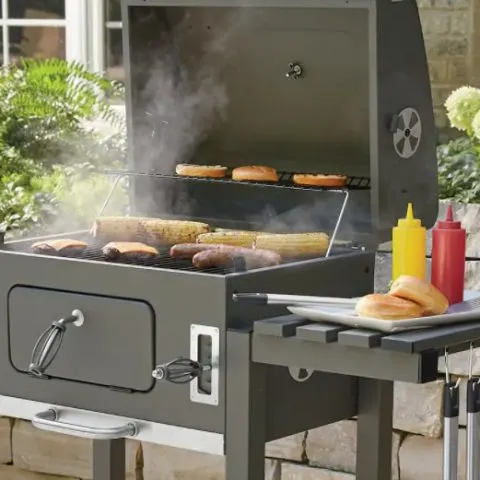Over the last few decades, the focus on food-induced diseases has led to a change in the way meals are prepared and how food is grown. The main area of concern has been the presence of carcinogenic substances in food. Or the transformation of food molecules into carcinogenic compounds due to exposure to heat.
This article will review the effect of charcoal and gas grilling on food and determine which of the two grilling methods is better-where health concerns are involved. Keep reading to learn more about charcoal and grill health issues.
Is grilling with charcoal carcinogenic?
No. According to research, charcoal grilling leads to meat’s infusion with two types of carcinogenic molecules. The molecules are known as heterocyclic amines (HCAs) and polycyclic aromatic hydrocarbons (PAHs). The molecules are created when fat from the meat drips onto the grill and breaks down due to overheating. These two molecules lead to an increased risk of developing cancer.
A lot of things are known to cause an increase in cancer risk. This does not mean that they will give you cancer. Additionally, gas grilling also leads to the production of PAHs and HCAs. There are steps you can take to reduce the breakdown of fat. Try to grill your meat at a lower temperature to avoid reaching the smoking point of natural meat fat.
Next, you need to marinate your meat in vinegar or lemon juice, which has been shown to reduce HCA production by 90%. Additionally, flipping your meat frequently has also been shown to reduce the production of HCAs. Lastly, trim the fat on your meat to reduce fat drips on
Is there a type of grilling charcoal that is healthier?
No. all charcoals used for grilling do lead to HCAs and PAHs production, especially if you grill at a too high temperature. However, if you choose to grill indirectly on the opposite side of the fire on your grill, you may be able to limit the amount of volatile carcinogenic compounds produced.
Additionally, you can opt to smoke your meat instead of direct grilling, as this will reduce fat drippings breakdown while cooking the meat.
Is lump charcoal bad for you?
There is limited research on lump charcoal. However, manufacturers of lump charcoal claim it is healthier than regular charcoal. On account of the charcoal being additive-free and lighter fluid free, unlike traditional charcoal and instant-light charcoal.
Which type of grill is healthier?
Grilling on a closed flame gas grill is the healthier grilling option. Open gas grills are toxic as the meat is infused with compounds from the propane or natural gas. But they are still better than charcoal grilling.
What is a closed flame gas grill?
This is a gas grill that uses a griddle to grill your meat. The meat does not get into contact with the flame, hence the name closed-flame. It used indirect heating to grill the meat. This reduces the chances of meat fat breaking down when burnt on the direct flame.
Check this too: When to Replace Grill Burners
Pros and cons of a charcoal grill
Now that you know all there is to know regarding the health concerns associated with grilling. Here are some pointers to help you decide which type of grill you should consider for your grilling needs.
| Pros | Cons |
|---|---|
| · Better meat flavor · Unhealthy · Affordable · Highly portable · High temperature | · Tree cutting is bad for the environment. · Starting a fire is cumbersome · Can only be used outdoors · Considered a fire hazard in apartment · Temperature and flame is difficult to control |
Pros and cons of a gas grill
| Pros | Cons |
|---|---|
| · Healthier · Smokeless · Environmentally friendly · Easier to start the fire · Can be used indoors or on an apartment patio · Easy to put off the flame · Easy flame and temperature control · Safe to use | · May affect meat flavor. · Difficult to transport · More expensive than charcoal · Limited temperature range |
Check this too: Instant Pot Troubleshooting & how-to Guide

